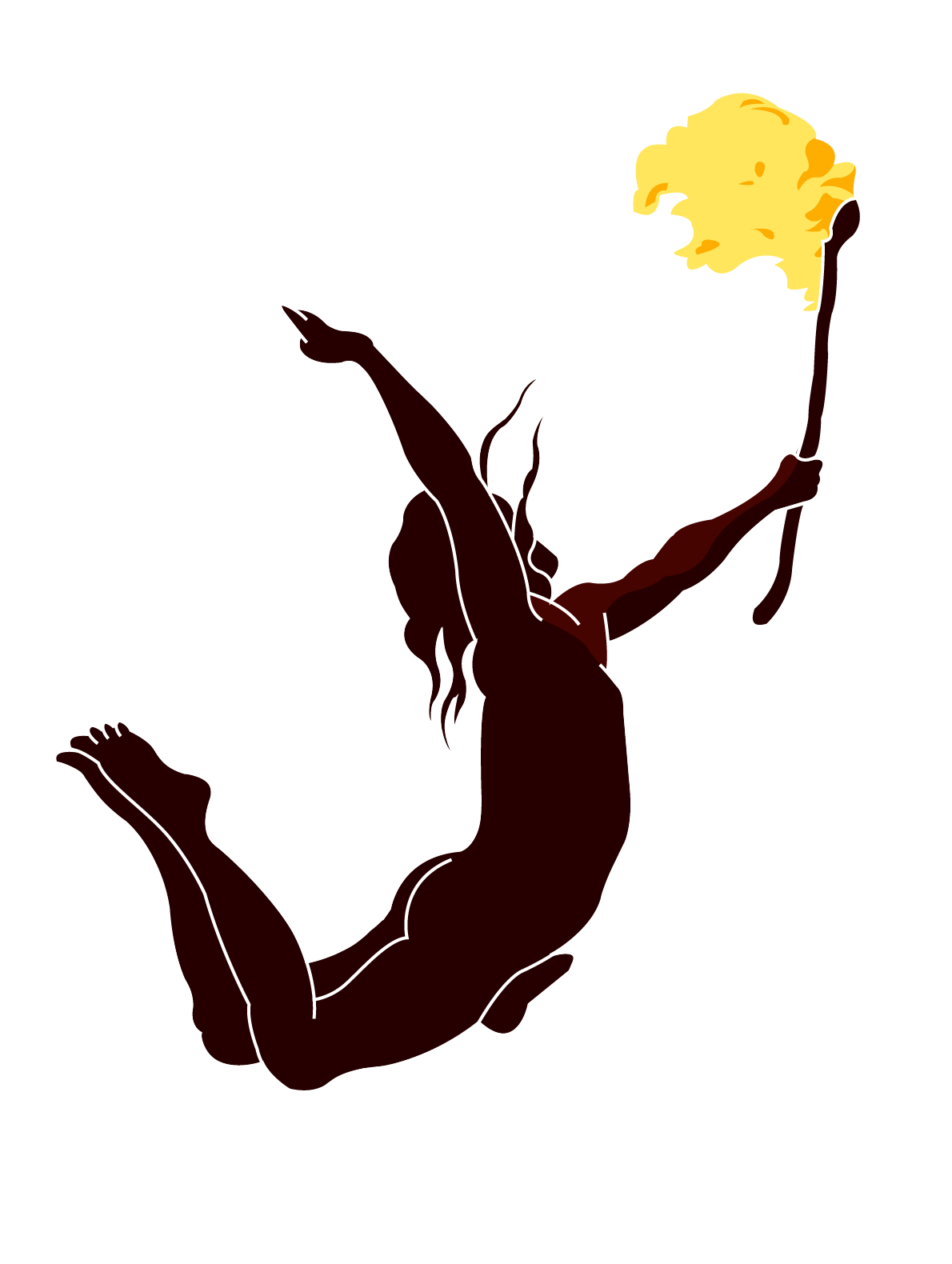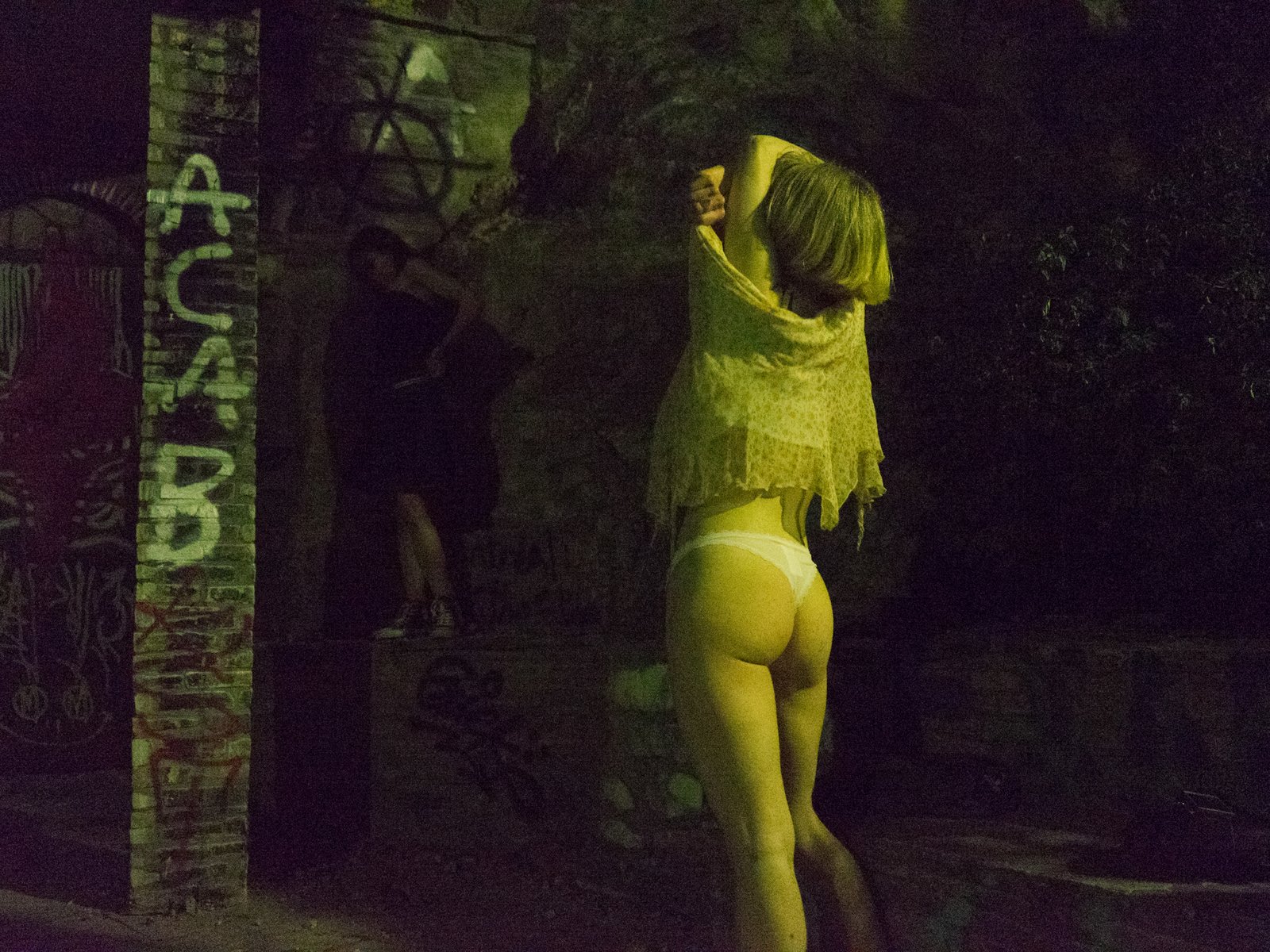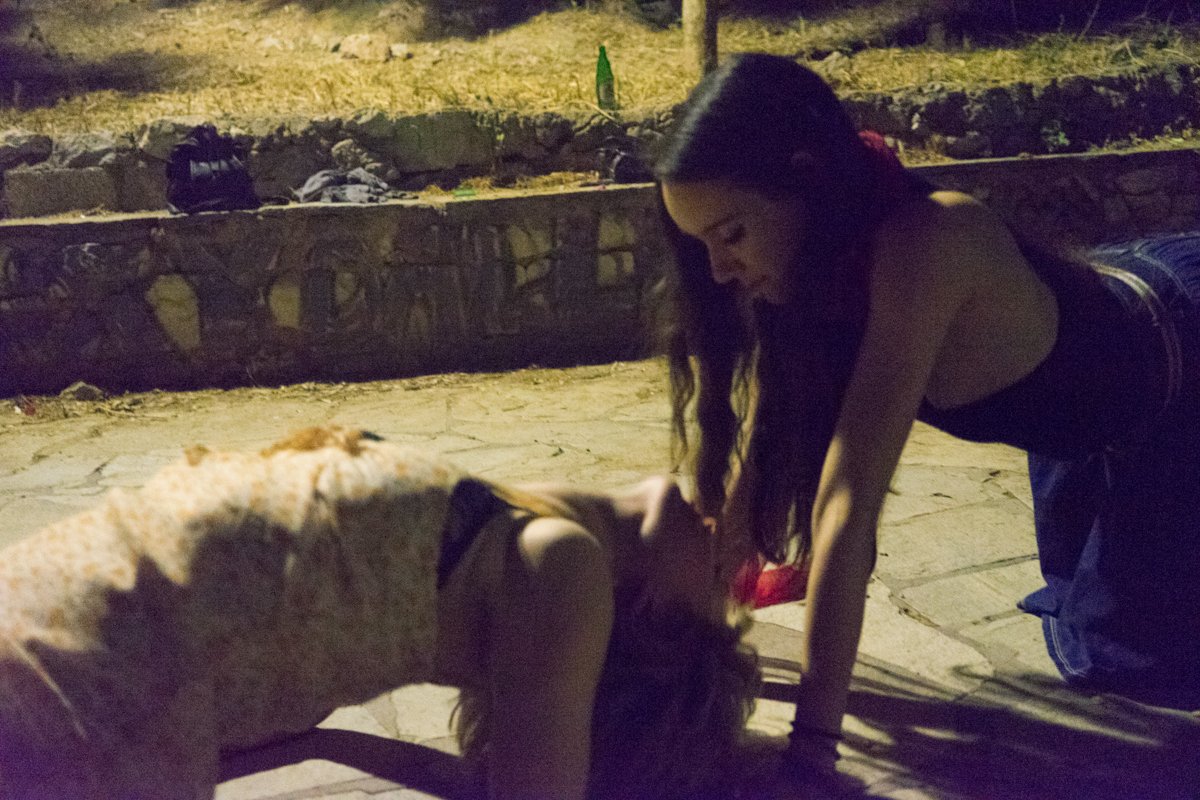ACAB, 2017 – Series, Acab
Just a few hundred meters from Exarchia Square, Athens’ popular political center.
Polyamours in a public park, under the stigma of class and anti-capitalist struggles
Love in Athens under the stigma of the anti-capitalist struggle
Commentary on the Philoxenia photographic series
These photos are from a series taken in spring 2017 in the heart of Exarchia, Athens.
The story begins near the square of Exarchia, a strategic center of contestation of power by the Athenian left and ultra-left. After a drink in one of the bars surrounding the square, we decided to go for a walk in the heights.
The impromptu result of a three-way love encounter, we were walking through Lofos Strefi Park at night.
Among my close friends for a few nights, one is German, the second is Greek, and I myself am French. This may seem unimportant, but the context embodied in the setting compels me to make it clear.
We were looking beyond the tensions that were brewing in Athens between these three countries and, sadly, throughout Europe. Indeed, European austerity has produced a feeling of economic invasion in Athens. Germany has bought up a large number of Greek institutions, museums and airports without any compensation for the citizen. Ironically, we were at Documenta, a major art event of German origin, which was holding its first edition in Athens. It was described to me by many of the local artists I met as a cultural invasion, a “lesson”, rather than a spotlight on Greek culture, despite its friendly title “Learning From Athens”.
Far be it from me to build additional political tensions between these countries; neoliberalism takes care of that all by itself.
On the contrary, it’s the very fact that these tensions exist, visually marking the environment and behavior, that our encounter constitutes an overcoming, and it’s through our philoxenia that we upset these norms.
That evening, there was no question of politics, culture or the fight for our sovereignty. But it was Eros, the creative power that directed our steps, in an emotional balance of a rare quality, whose photography and desire for the other led us to speak to each other, to meet, to touch.
The remarkable thing about the trio is that it’s a constant emotional adjustment, a constant care and attention that each must give to the other two. It is in this perpetual search for balance that politics emerges for me at its highest level: the balance and harmony of several bodies in a space.
That evening, under the stigma of neoliberalism and recent rebellions against the violence of capital led by police repression, we were making love in this park; around us, anarchists protected us, we felt free.
These photos testify to the meeting that preceded our embrace.
Focused on our desire, the inscription ACAB graffitied in white on the rack didn’t seem obvious to us that evening, yet it structures the series, imposing itself on the eye with almost more presence than the bodies in the foreground. ACAB not only structures this series, its omnipresence marks Athens, covering the ancient buildings that dot the city, but also Paris, Berlin, Hong Kong, and hundreds of other cities that are undergoing increasing police repression, revealing that our liberal societies as a whole are at breaking point. The ACAB inscription, which was the first title in the series, dominates the photo before giving way to Philoxenia.
Wherever spaces of freedom emerge, however small, popular culture is established. Will this brand go down in history as the symbol of a
Wherever tiny spaces of freedom emerge, popular culture is established. Will this brand go down in history as a symbol of revolution in the style of “Liberty guiding the people”? If so, this bodes well for the violence of subsequent revolutions.
Since 2012, Exarchia has been a self-managed neighborhood controlled by anarchists. Greek propaganda portrays this area as a dangerous, lawless zone.
A poor neighbourhood, yes, but a dangerous one? These photos are a testament to our freedom.
Yet, in the summer of 2019, what prompts me to write these lines somewhat hastily is to draw attention to current events at Exarchia:
The newly-elected right-wing Greek government has decided to put an end to this independence, using unprecedented repression to dislodge the anarchists and migrants who have been welcomed in this neighborhood for many years.
I’m no longer on site and can find few reports describing the situation.
But having looked closely at what happened at Notre-Dame-des-Landes or in the French revolutionary demonstrations, I can say without too much doubt that it’s still the same violence of capital at work.
Erotizing ink struggles and linking social demands, which can sometimes appear as ideology, to a more powerful, deeper level, to the matrix of life.
Transforming what can be discussed, debated into evidence.
Eroticizing struggles creates links between social bodies whose aspirations are the same, but whose trajectories are parallel.
If May 68 triumphed, it was also partly thanks to sex. Eros is the central vector of a successful revolution, altering the limits of the social body from within, and consequently rebalancing concentrations of power.
The power of eros lies in the fact that it blurs the edges of the individual and reflects this blurring onto the social body.
Knowledge about sex, its restriction and control, is a power exercised over the individual.
That evening, the photos were not about politics, but rather a pretext for pleasure, a pretext for freedom, or perhaps simply a pretext for sex.
That evening, the stakes in these photos were not political, but had become so. What makes the subject political is life, which, through eros, comes face to face with its truth, and which, with the force of evidence, makes the context (the scene) political.
Eros, the primordial god of love and creative power, is the privileged mode of the appearance of life.
A revolution driven solely by anger at injustice is likely to end in war. It is only if there is an alliance with life, with sex, with philoxenia, with love, through a questioning of one’s knowledge, one’s edges, one’s limits, that the revolution propelled by life itself, acquires the capacity to overcome the pre-existing institutions of power.
The sexual revolutions, particularly that of ’68, were not only emancipatory, but also produced abuses of women’s and children’s bodies, through the injunction to “enjoy without hindrance”. Eros is not an injunction to sex, on pain of reproducing the very dominations that these same struggles sought to abolish, and of deeply infecting emancipation at its source.
Eros is much more an active word, producing perlocutionary effects, a perennial poem that emerges from our bodies.
A poem marching without fear to reclaim public territory.
A poem working to build a collective, where each body is recognized and recognizes itself in another.
A poem that’s not just words, but flesh and bone.
That evening, the photos were not about politics, but rather a pretext for pleasure, a pretext for freedom, or perhaps simply a pretext for sex.
That evening, the stakes in these photos were not political, but became so when life, through eros, confronted its own truth. And so, with the implacable force of the obvious, the scene became politicized.
Eros, the primordial god of love and creative power, is the privileged means by which life manifests itself.
A revolution driven solely by anger in response to injustice is likely to degenerate into war. Only when it allies itself with life, sex, philoxenia and love, questioning its own knowledge, boundaries and limits, can it, propelled by life itself, acquire the strength needed to triumph over the established powers.
The sexual revolutions, particularly that of ’68, were not only liberating; they also led to abuses of women’s and children’s bodies, under the influence of the injunction to “enjoy without hindrance”. Eros must not be a summons to sex, at the risk of perpetuating the dominations that these struggles sought to dismantle, thus corrupting emancipation at its source.
Eros is much more than a discourse: it produces actions and consequences, a living poem that springs from our bodies.
It’s a poem that moves fearlessly towards reclaiming public space.
It’s a poem that works to build a community that flourishes as our shared emotional understanding is refined.
For in the essence of Eros lies a subversive nature, free from violence.
Eros is intrinsically subversive because it refutes and destroys the systems of domination and violence that preceded it.
It presents bodies one to another, unequal in their social trajectories (gender, ethnicity, social class, orientation), but equal in their encounter. He forges their equality through their differences to build their harmony.
By linking this harmony to the matrix of life, he gives it invincible strength.
Reinvent your relationship, reinvent your gender, reinvent your attractions, reinvent your modesty, reinvent your image and the social pressure it puts on you.
Redefine the social limits of your desires.
Redefine your traumas.
Redefine your shame.
Accumulated knowledge about gender, and the humanities as a whole, exerts power over social structures.
Discover the story behind these works by visiting our online store, where you can purchase them if they resonate with you.






